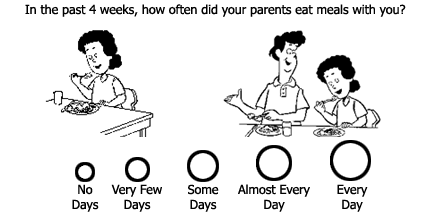New Tool Measures Children’s Own Health Perceptions
February 25, 2004
New Tool Measures Children’s Own Health Perceptions
CHIP Assessment Tool Accurately Predicts Health Care Usage Among Children
 Parents and children do not always agree in their assessments of the child’s health. Parents usually report that their children are feeling better than the children say they are. Researchers at the Johns Hopkins Bloomberg School of Public Health found that children as young as 6 can accurately report on their health and well-being when questions are presented in an illustrated, informative format. They have developed a set of new assessment tools to measure children’s perceptions of their own health and well-being, called the Child Health and Illness Profile, Child Edition (CHIP-CE). The researchers also found that the Child Report Form of the CHIP-CE is an accurate predictor of children’s future health care service use. Three manuscripts in the March 2004 edition of the journal Medical Care present the development and validation of the instruments. The CHIP-CE is a measure of self-assessed health that can provide a valuable new means for describing the health needs of community children, as well as those in clinical settings, evaluating the impact of health and social policies and health interventions, as well as for understanding the development of health as children mature.
Parents and children do not always agree in their assessments of the child’s health. Parents usually report that their children are feeling better than the children say they are. Researchers at the Johns Hopkins Bloomberg School of Public Health found that children as young as 6 can accurately report on their health and well-being when questions are presented in an illustrated, informative format. They have developed a set of new assessment tools to measure children’s perceptions of their own health and well-being, called the Child Health and Illness Profile, Child Edition (CHIP-CE). The researchers also found that the Child Report Form of the CHIP-CE is an accurate predictor of children’s future health care service use. Three manuscripts in the March 2004 edition of the journal Medical Care present the development and validation of the instruments. The CHIP-CE is a measure of self-assessed health that can provide a valuable new means for describing the health needs of community children, as well as those in clinical settings, evaluating the impact of health and social policies and health interventions, as well as for understanding the development of health as children mature.
“The concept of what it means to be healthy has evolved beyond the mere absence of illnesses to encompass the idea that health is a resource that allows individuals to adapt to demands and to flourish in their lives. Health perceptions and well-being are central to this integrated concept of health. Previously, we could not measure the health of children from their own viewpoint. The CHIP-CE is an effective, new tool for assessing child health from the perspectives of children themselves and their parents,” said study author Anne Riley, PhD, associate professor with the School’s Department of Health Policy and Management and lead developer of the CHIP-CE.
The CHIP-CE questionnaire is designed for children ages 6 through 11. A companion parent report form measures caregivers’ perceptions of their children’s health. Illustrations and multiple-choice questions are used in the CHIP-CE to assess children’s well-being, comfort, risk avoidance, resilience, and achievement.
|
Sample question from the CHIP-CE resilience domain |
The CHIP-CE child report form and parent report form were developed by working with children, parents, and other experts. The research was done in dozens of school and health care settings in multiple states. The CHIP-CE instruments have been shown to be reliable and valid in studies involving over 2,000 children and their parents in geographically, racially, and socio-economically diverse areas of the United States. The CHIP-CE has also been demonstrated to be practical for use in schools and clinical settings. One of the validation studies found that child and parent reports on the CHIP-CE were predictive of the number of doctor visits the children made in the following year. “A child’s sense of well-being and burden of symptoms predict health care use in the future. Children’s perceived well-being, as assessed by the CHIP-CE, is a better predictor of children’s service use than parent reports or physician-diagnosed disorders,” said co-author and pediatrician, Christopher Forrest, MD, PhD, associate professor of Health Policy and Management.
The CHIP-CE builds upon the earlier success of the CHIP-Adolescent Edition, which was developed for children ages 11 to 18 by the same team, led by Barbara Starfield, MD, MPH, University Distinguished Professor with the School’s Department of Health Policy and Management. The CHIP assessment tools were developed and tested over a 12-year period. Together, they provide the means to assess the health of children from their early school years through adolescence, using a consistent model of health and many of the same questions. The CHIP instruments address the need for methods to study life transitions and other influences on the health of youth, which is known to be an important factor in successful school achievement and transition to adulthood.
“The Child Report Form of the CHIP-Child Edition, Reliability and Validity” was written by Anne W. Riley, PhD; Christopher B. Forrest, MD, PhD; George W. Rebok, PhD; Barbara Starfield, MD, MPH; Bert F. Green, PhD; Judith A. Robertson, BS; and Phyllis Friello, MS.
A majority of the funding for the CHIP-CE studies was provided by the Agency for Healthcare Quality and Research of the U.S. Department of Health and Human Services. Additional funding was provided by a grant from the National Institute of Child Health and Human Development.
For more information about CHIP-instruments, please visit www.chip.jhu.edu.
Public Affairs Media Contacts for the Johns Hopkins Bloomberg School of Public Health: Tim Parsons or Kenna Brigham at 410-955-6878 or paffairs@jhsph.edu. Photographs of Anne Riley and Christopher Forrest are available upon request.
